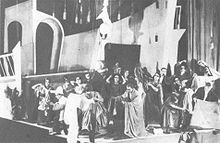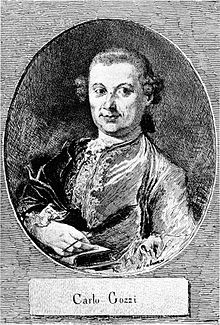- Carlo Gozzi
-
 Princess Turandot, performance by Yevgeny Vakhtangov (1922).
Princess Turandot, performance by Yevgeny Vakhtangov (1922).
Carlo, Count Gozzi (13 December 1720 – April 4, 1806) was an Italian playwright.
Born in Venice, he came from an old Venetian family from the Republic of Ragusa. His father's debts forced him to look for a means of supporting himself, and at the age of sixteen, he joined the army in Dalmatia; three years later he returned to Venice, where he soon made a reputation for himself as the wittiest member of the Granelleschi society, to which the publication of several satirical pieces had gained him admission. This society, nominally devoted to conviviality and wit, had serious literary aims, and was especially zealous to preserve Tuscan literature from foreign influence.
The displacement of the old Italian comedy by the dramas of Pietro Chiari and Carlo Goldoni's works, modelled on French examples, threatened to defeat the society's efforts; in 1757 Gozzi came to the rescue by publishing a satirical poem, La tartana degli influssi per l'anno 1756, and in 1761 by his comedy, The Love of Three Oranges or Analisi riflessiva della fiaba L'amore delle tre melarance, a parody of the manner of the other two poets, founded on a fairy tale. To perform it, he obtained the services of the Sacchi company of players, who, thanks to the popularity of the comedies of Chiari and Goldoni—which offered no scope for the display of their peculiar talents—had been left without employment. Their satirical powers thus sharpened by personal enmity, the play was an extraordinary success.
Struck by the effect produced on the audience by the introduction of the supernatural or mythical element, which he had merely used as a convenient medium for his satirical purposes, Gozzi produced a series of dramatic pieces based on fairy tales, which were briefly popular, but after the breaking up of the Sacchi company were completely disregarded. They were much praised by Goethe, Schlegel, Madame de Staël and Sismondi; and one of them, Turandot or Re Turandote, was translated by Friedrich Schiller.
In his later years Gozzi began to produce tragedies in which the comic element was largely introduced; as this innovation proved unacceptable to the critics he turned to the Spanish drama, from which he obtained models for various pieces; these had minor success.
His brother, Gasparo Gozzi, was also a well-known writer of the time.
His collected works were published under his own superintendence, at Venice, in 1792, in 10 volumes.
A number of twentieth-century stage works were inspired by Gozzi's plays. These include treatments of Turandot by Karl Vollmöller and Bertolt Brecht, operas based on the same story by Busoni and most famously Puccini and Prokofiev's The Love of Three Oranges.
Plays
- L'amore delle tre melarance (1761)
- The Crow (1762)
- The Stag-King (1762)
- Turandot (1762)
- The Serpent Woman (1763)
- Zobeda (1763)
- The Fortunate Beggars (1764)
- Il mostro turchino (1764)
- The Green Bird (1765)
- Zeim, King of Genies (1765)
- Marfisa bizzarra (1766)
- The Elixir of Love (1775/1776)
References
- The Memoirs of Count Carlo Gozzi at gutenberg.org
 This article incorporates text from a publication now in the public domain: Chisholm, Hugh, ed (1911). Encyclopædia Britannica (11th ed.). Cambridge University Press.
This article incorporates text from a publication now in the public domain: Chisholm, Hugh, ed (1911). Encyclopædia Britannica (11th ed.). Cambridge University Press.
External links
Categories:- 1720 births
- 1806 deaths
- Commedia dell'arte
- Italian dramatists and playwrights
- People from Venice (city)
Wikimedia Foundation. 2010.

